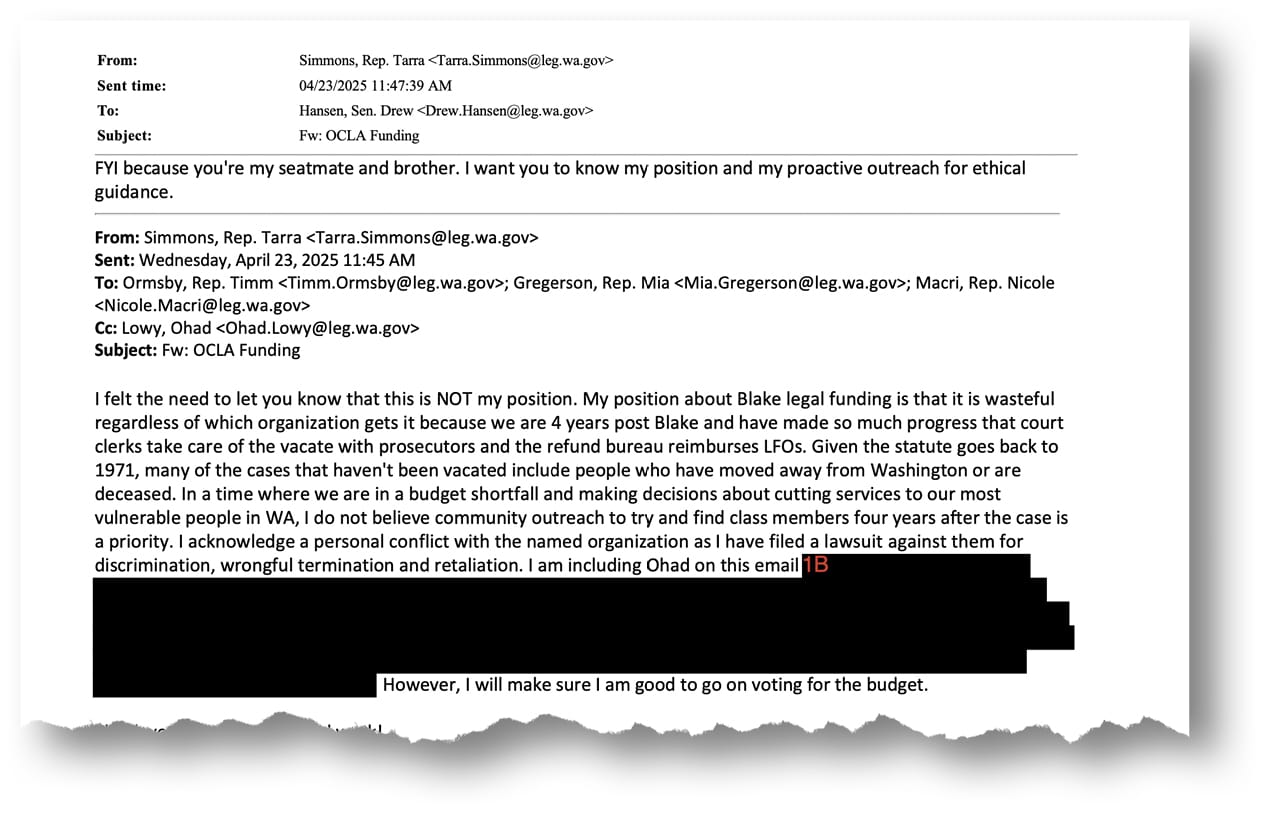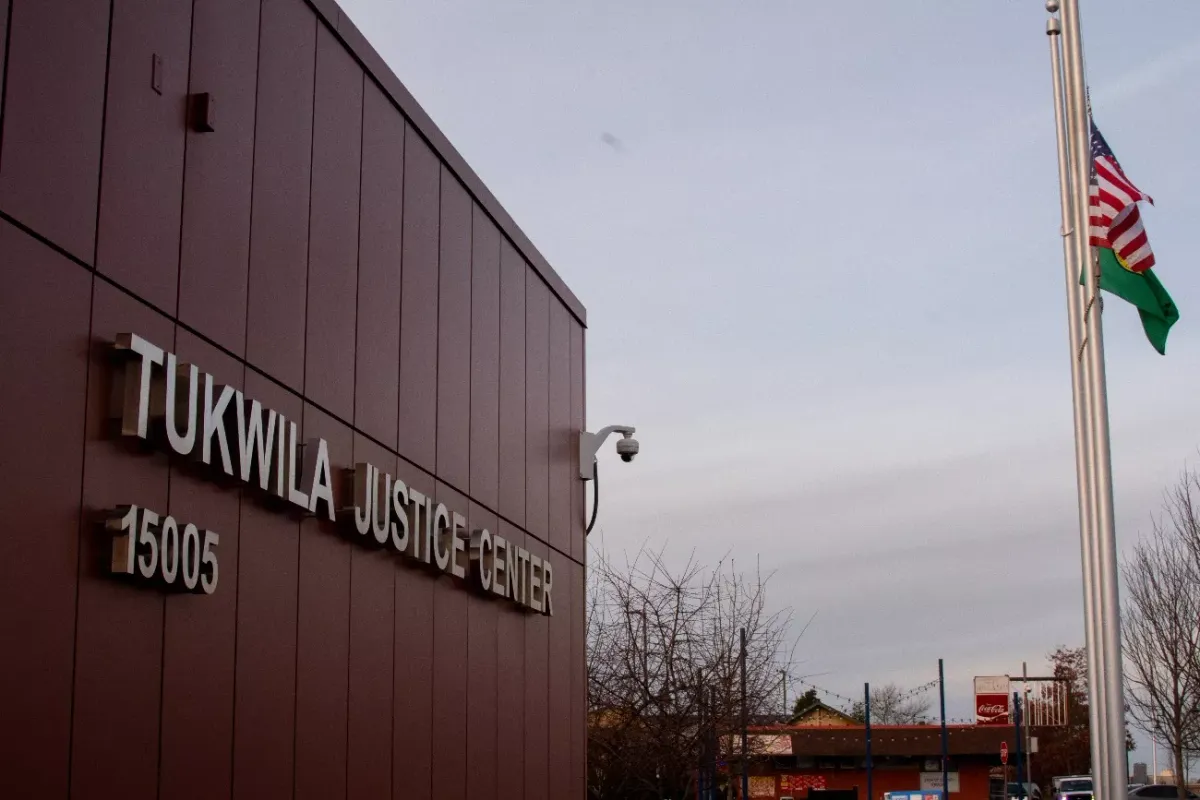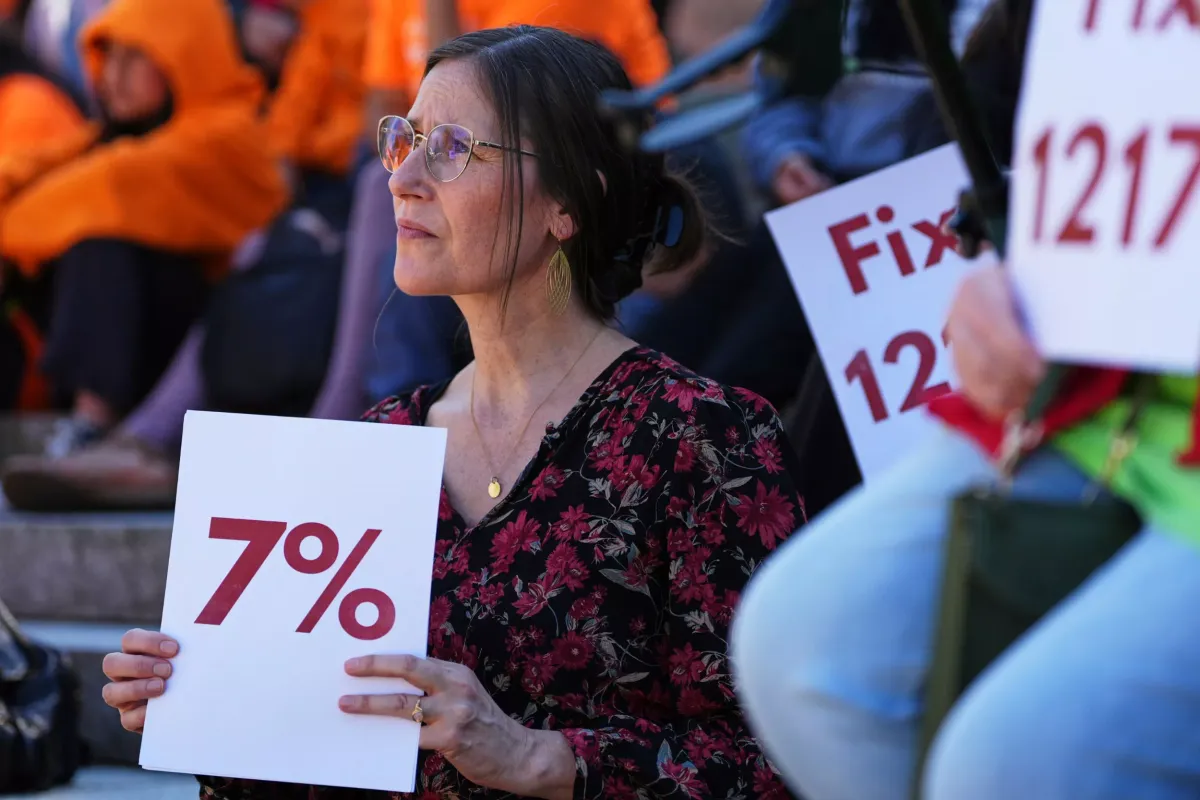Two Colville women were booked into a rural Washington jail. It became a death sentence
Critics say WA jails are letting opioid users suffer from withdrawals, leading to preventable deaths
After being fired from the legal aid group she once led, Rep. Tarra Simmons supported state cuts that crippled similar organizations

When Camerina Zorrozua learned in April that Washington had slashed its state funding of her Spokane-based legal aid organization, she frantically called state Rep. Tarra Simmons.
“I was so alarmed, and I asked her straight up, ‘What happened?’” said Zorrozua, the legal director and co-founder of The Way to Justice.
Simmons, the first formerly incarcerated lawmaker in Washington, has vowed to fight for other formerly incarcerated people and was the state representative who Zorrozua thought would have fought hardest against the cuts.
In 2021, Simmons, D-Bremerton, helped secure state funding to help hundreds of thousands of people vacate drug-related convictions from their criminal records, after the Washington Supreme Court deemed the state’s felony drug possession law to be unconstitutional in a ruling known as State v. Blake. In 2023, Simmons was able to vacate her own felony convictions. In media reports, she said it felt like she had been liberated from an “invisible prison.”
But the state Legislature’s decision in April to slash funding was a blow to organizations like The Way to Justice that have been key in providing legal support to those eligible to vacate their cases. And Simmons didn’t offer Zorrozua much of an explanation.
“She made it seem like she didn’t know,” Zorrozua said.
In fact, emails obtained by InvestigateWest show that, behind the scenes, Simmons supported the cuts, telling her colleagues that the state was nearly done with its work despite state data showing that only 38% of all the unconstitutional convictions had been vacated as of July 2025.
“My position about Blake legal funding is that it is wasteful regardless of which organization gets it,” Simmons wrote in an email to other lawmakers, including the chair and vice chairs of the House appropriations committee, where budget recommendations are made.
“In a time where we are in a budget shortfall and making decisions about cutting services to our most vulnerable people in WA, I do not believe community outreach to try and find class members four years after the case is a priority,” she wrote.
The emails, which state lawmakers have historically fought to be exempt from public disclosure, give a peek into the decision-making that left the impacted legal aid organizations and the state agency that doles out the funds confused and scrambling. The Office of Civil Legal Aid was originally allocated around $5 million in both the draft House and Senate biannual budgets to support its Blake-related civil legal aid efforts, but in the waning days of the legislative session, the funding disappeared from the final budget.

In State v. Blake, the Washington Supreme Court ruled that the state’s simple drug possession law was unconstitutional because it lacked language related to criminal intent, effectively criminalizing even “innocent and passive possession” of drugs in violation of a person’s due process rights. The historic decision not only made Washington’s law void but also made an estimated 330,000 past misdemeanor and felony convictions dating as far back as 1971 eligible to be wiped from a person’s criminal record. The state also must refund any financial costs stemming from the convictions. The number of eligible cases is considered a significant undercount because Washington's court system makes it difficult to gather historical conviction data.
Simmons told InvestigateWest that it wasn’t her intention to harm legal aid organizations, but given the extremely tight state budget, difficult decisions had to be made. “I’ve always fought for my community,” she said. “But my community also needs things like housing and food.”

But others have argued that the cuts were less about cost savings and more about her ongoing personal conflict with one of the state-supported legal aid organizations, Civil Survival. She served as its executive director from 2015 until she was fired from the organization in July 2024 following two separate third-party investigations that found repeated violations of the organization's policies, according to an open letter from its Board of Directors. When the budget cuts were made, Simmons was simultaneously suing the organization, which had received around $800,000 in 2023 and 2024 to support its Blake-related work, according to state contracts. The 2023 contract was signed by Simmons.
“Those funds weren’t wasteful when she was at the organization,” said Virla Spencer, the co-founder and CEO of The Way to Justice, referring to Simmons’ time at Civil Survival. “So make it make sense.”
On April 14, Washington state Sen. Drew Hansen sent an email to two budget analysts asking if cutting the Blake funding to the civil legal aid organizations would “do great damage.” It was two weeks before the budget was set to be finalized, during a time when every program was facing scrutiny as lawmakers scrambled to address a projected $16 billion budget shortfall.

Hansen, D-Bainbridge Island, wrote in the email that Simmons had shared with him that most of the state’s Blake-related work was “done” and that they were reaching the point of diminishing returns. Hansen, a lawyer, helped Simmons vacate her criminal record in 2023.
“I actually think my colleague may be on to something here (like, do we really need to do ‘outreach’ at the magnitudes that we’re currently doing),” Hansen wrote in an email to a budget analyst in April. “But I don’t have any expertise in this area and it’s hard for me to evaluate.”
While Simmons claimed to her fellow lawmakers that the Blake work was nearly complete, state data tells a different story.
Only 29% of eligible cases in superior courts; 10% of cases in district courts; and 36% of cases in municipal courts have been successfully vacated as of July 2025, according to a data analysis compiled by the Washington Office of Public Defense using Washington State Patrol data. The team estimates it will take another six years to vacate the remaining cases.
In Kitsap County, which Hansen and Simmons represent, 57% of cases in Superior Court, 18% of cases in the municipal court, and 2% in the District Court have been vacated. There are approximately 6,117 cases left in the county eligible to be vacated.
Simmons told InvestigateWest that she thinks a lot of the cases that are left are for people who have either moved out of state or died, which is why she felt like the funds should be allocated elsewhere. When directed to the state data showing that only 38% of eligible cases have been vacated as of July 2025, Simmons said she still stood by her assessment.
“Seniors need food, kids need food, Medicaid is being cut, and undocumented citizens need civil legal aid,” she said. “It just does not seem like that is the top priority.”

While some courts have been proactive in identifying and vacating eligible Blake cases, others have left it up to the individuals to navigate the convoluted system and initiate the process independently. The state has been working to streamline the process and provide more support to local courts tasked with identifying and vacating their eligible cases, but there’s still a long way to go.
The process, which has to be initiated at the court where the conviction was given, involves three distinct steps: resentencing cases that involve more than just a possession charge; vacating eligible cases off a person’s criminal record; and filing a refund request with the state’s Blake Refund Bureau once a vacate is issued, which can be anywhere from a few dollars to thousands.
Civil legal aid and reentry organizations have been critical in helping to get the word out about the historic ruling and guiding people through the legal process. According to previous state contracts, the state funding historically doled out by the state’s Office of Civil Legal Aid was specifically to fund legal services, public education campaigns and targeted services for people impacted by President Richard Nixon’s “war on drugs,” which helped fuel mass incarceration and disproportionately targeted communities of color.
While the funding to the Office of Civil Legal Aid was cut this year, two other state agencies are still receiving funding related to Blake: the Office of Public Defense, to support counties proactively working through their Blake cases; and the Administrative Office of the Courts, which provides refunds for any legal financial obligations paid as a result of the unconstitutional conviction.
Zorrozua, from The Way to Justice, said she’s grateful for the work Rep. Simmons has done around criminal justice reforms, like helping to pass the New Hope Act, which makes it easier for a person to vacate their criminal record to improve access to housing and employment.
But Simmons is “way off base here” about Blake funding, she said.
Outreach is a critical component of Blake work, Zorrozua said. They’ve planned pop-up events, vaccination clinics and tabling at community events where they can meet people outside of a court setting to build trust.
“She’s forgetting about all of her brothers and sisters who have been through the carceral process, who don’t have the privilege to have private counsel come in and clear their records,” Zorrozua said.

In late October, Zorrozua said she assisted a man with immigration status issues who had a Blake-eligible conviction on his record. Removing the unconstitutional conviction from his record would “make a huge difference” in whether or not he wins his immigration case, she added. Since the budget cuts, the Way to Justice has had to start charging clients for its services.
“I don’t want to wait for our clients to die to close the Blake file,” she stressed. “They are entitled to relief. They were entitled to relief years ago.”
Zorrozua said it feels as if Simmons has a short-term memory.
“Because I remember when I went into one of her campaign events, this used to be what Tarra ran on, justice for impacted communities,” she said. “She’s saying she’s focusing on immigration, housing and employment. And it’s like, how the hell don’t you see the connections between those things?”
In the email to her fellow lawmakers at the end of the 2025 legislative session, Simmons acknowledged she had a “personal conflict” with Civil Survival but stressed to her peers that she wasn’t advocating for the funding to be cut specifically from her former organization, but to all of the organizations.
Simmons was fired in 2024 from Civil Survival for repeatedly mistreating staff and violating policies, according to a statement published by the organization’s staff, and for threatening to cut off critical funding.

She later sued the organization for discrimination and wrongful termination, alleging that she didn’t receive the disability accommodations she’d requested for post-traumatic stress disorder. They reached a settlement in September 2025 for an undisclosed amount. “I got a large amount of money because they harmed me,” she said. “It’s been a very painful thing.”
Corey Guilmette, the co-executive director at Civil Survival, told InvestigateWest that they chose to settle the case with Simmons to protect the formerly incarcerated members of their staff from having to testify in court.
“We are dedicated to helping our community heal and continuing litigation that would force not only directly impacted staff members, but community members, including people in prison, to confront their trauma in a courtroom, did not advance that mission,” he said.
Guilmette said the state funding cuts caused them to lay off staff attorneys.
“We pretty much have to turn away two-thirds of clients, because if we say yes to any more than that, we know that we won’t be able to serve people adequately,” he said.
An update to this story clarified a comment Rep. Tarra Simmons made regarding Blake cases not vacated because individuals died or left the state.
The story you just read is only possible because readers like you support our mission to uncover truths that matter. If you value this reporting, help us continue producing high-impact investigations that drive real-world change. Your donation today ensures we can keep asking tough questions and bringing critical issues to light. Join us — because fearless, independent journalism depends on you!
— Jacob H. Fries, executive director
DonateCancel anytime.
Subscribe to our weekly newsletters and never miss an investigation.